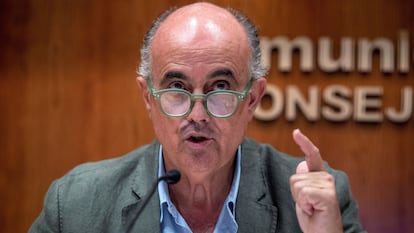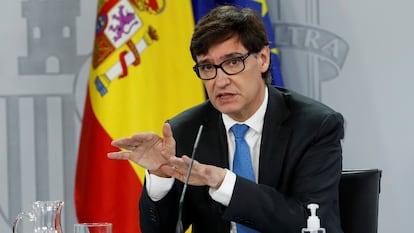Madrid extends coronavirus restrictions on mobility to eight new areas and recommends staying at home
In an unusual turn of events, Health Minister Salvador Illa held a press conference on Friday where he made clear that, in the government’s opinion, the region is not going far enough

The Madrid regional government announced on Friday that it will extend the coronavirus mobility restrictions that currently affect 37 basic health areas in the region to eight new zones.
Speaking at a press conference on Friday morning, Madrid’s deputy health chief Antonio Zapatero said the move was aimed at “stopping the spread of the coronavirus” in the region, which has the highest incidence rate of Covid-19 in Spain, with 746.2 cases per 100,000 inhabitants.
Our main concern is slowing the virus. We are recommending that all non-essential travel be avoided.Madrid’s deputy health chief Antonio Zapatero
The restrictions will be applied to eight basic health areas – a unit that is much smaller than a city district and can include several primary healthcare centers – that have an incidence rate of more than 1,000 cases per 100,000 inhabitants. The affected areas are Panaderas (Fuenlabrada); Miguel Servet and Doctor Tueta (Alcorcón); García Noblejas, Vicálvaro-Artilleros, Orcasitas, Campo de la Paloma and Rafael Alberti (Madrid city).
From Monday, residents in these areas will only be able to leave the restricted zones for essential business, such as going to school or work, or to care for dependents. Capacity at stores and other commercial establishments will be set at 50% and closing time at 10pm with the exception of pharmacies, gas stations and health centers. Bar service will be prohibited and public parks in the affected zones will also be closed. The measures will come into effect on Monday and last for at least two weeks. A total of 45 health areas, which are home to more than one million residents, have now been confined.
Residents who break the restrictions on mobility could face fines of between €600 and €600,000, according to the current health protocols. But authorities have said that police will not issue fines until the Madrid High Court has ratified the health department’s order.
Zapatero also recommended that all residents in the Madrid region stay at home: “Our main concern is slowing the virus. We are recommending that all non-essential travel be avoided.”

In an unusual turn of events, Health Minister Salvador Illa held an unexpected press conference at the same time that Zapatero was speaking, announcing that he had expected more ambitious measures from the Madrid government, such as reducing the capacity at sidewalk cafes across the region.
Illa also called on the Madrid government to confine all areas with an incidence rate above 500 cases per 100,000 inhabitants.
According to data released by the Madrid government on Tuesday, 16 health areas have an incidence rate above 1,000 cases. Despite this, only eight of these zones have been placed under the new restrictions.
The Madrid regional government has not ruled out introducing further measures in the coming weeks, such as ordering all commercial establishments in the region to close by 10pm
There has been friction between the Madrid region and the central government since the state of alarm was introduced back in March. Regional premier Isabel Díaz Ayuso of the conservative Popular Party (PP) was highly critical of the suspension of her government’s powers during the emergency period and had demanded they be returned. Since June, however, when the state of alarm ended and the regions were put in charge of controlling the epidemic, the epidemiological situation has quickly worsened in Madrid, prompting Ayuso to do a U-turn and call on the central government to intervene. An uneasy peace appeared to have been reached between the Madrid premier and Socialist Party Prime Minister Pedro Sánchez on Monday when they held a meeting and agreed to work together to deal with the situation in Madrid. The divisions on display on Friday, however, suggest that peace has been shattered.
Asked by journalists as to the spirit with which the next coordination meeting between the central government and the Madrid administration will be held, given that the latter has not taken the advice of the former, Illa said at his press conference on Friday that it would “always be with the constructive spirit of loyalty, but with great clarity, with the aim of taking control of the epidemic.”
Illa was also asked as to what would need to happen for the government to take control of the Madrid region. “The responsibility at this time for taking measures clearly corresponds to the Madrid region,” he answered. “I have explained the measures that we have recommended, and the government wants them to be known about by citizens in an exercise of transparency.”
Zapatero, meanwhile, argued that the decision to confine areas cannot be solely based on transmission rates, as this figure “is closely related to diagnostic capacity. That’s why we monitor other data.”
The Madrid regional government has not ruled out introducing further measures in the coming weeks, such as ordering all commercial establishments in the region to close by 10pm – not just in the 45 health areas under selective confinement.
In the rest of the Madrid region, stores can open until 1am (unless they are licensed to close earlier), bars and restaurants can operate at 75% capacity and bar counters are at 50% capacity. As of mid-August, nightclubs and nighttime bars across Spain have been closed.
Epicenter of the pandemic
A spike in outbreaks over the summer months after powers to control the epidemic had been fully restored to the regions evidenced that the Madrid government had not prepared sufficiently for a second wave despite pledges to do so during the deescalation process. Doctors from 62 of the region’s hospitals claim 95% of intensive care units (ICUs) are occupied by Covid-19 patients, the region’s primary healthcare system is stretched to the limit, and there are still not enough contact tracers to manage the crisis.
With more than 100,000 new infections since August 1 in the Madrid region, and 3,215 coronavirus patients in its hospitals, the regional administration is once again staring into the abyss of a combined health, economic and social crisis. According to experts, measures introduced so far by the Madrid region have arrived too late, and many believe that the lockdown of the entire city will be inevitable in just a few days.
English version by Melissa Kitson.
Tu suscripción se está usando en otro dispositivo
¿Quieres añadir otro usuario a tu suscripción?
Si continúas leyendo en este dispositivo, no se podrá leer en el otro.
FlechaTu suscripción se está usando en otro dispositivo y solo puedes acceder a EL PAÍS desde un dispositivo a la vez.
Si quieres compartir tu cuenta, cambia tu suscripción a la modalidad Premium, así podrás añadir otro usuario. Cada uno accederá con su propia cuenta de email, lo que os permitirá personalizar vuestra experiencia en EL PAÍS.
¿Tienes una suscripción de empresa? Accede aquí para contratar más cuentas.
En el caso de no saber quién está usando tu cuenta, te recomendamos cambiar tu contraseña aquí.
Si decides continuar compartiendo tu cuenta, este mensaje se mostrará en tu dispositivo y en el de la otra persona que está usando tu cuenta de forma indefinida, afectando a tu experiencia de lectura. Puedes consultar aquí los términos y condiciones de la suscripción digital.









































